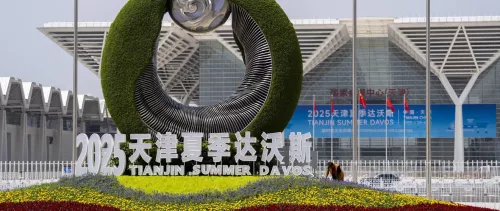
European nations have the best digital quality of life, according to a survey conducted by cybersecurity company Surfshark. Image: Unsplash/Ales Nesetril
- Our general wellbeing is affected by our ability to access the online world – our so-called digital wellbeing.
- Europe scores highly for digital wellbeing, particularly for having fast, affordable internet access.
- The World Economic Forum’s EDISON Alliance aims to tackle the digital divide and boost digital inclusion.
In many nations around the world our devices, connections and online experiences shape how we live and thrive. With technology built into our work, education and leisure time for so many of us, our “digital wellbeing” has become strongly linked with our overall wellbeing.
But when it comes to secure, affordable, and reliable access to the online world, not all countries benefit from the same privileges. So which countries are thriving digitally – and where is the digital divide really making its presence felt?
Europe is digitally thriving
European nations have the best digital quality of life, according to a survey conducted by cybersecurity company Surfshark. Its latest Digital Quality of Life Index evaluates 121 countries across five pillars it deems critical to digital wellbeing: internet affordability; quality; infrastructure; security and e-government services.
Coming out top overall is France, with European nations making up nine of the top 10 countries for digital quality of life globally. One of the main reasons for France’s top ranking is the affordability of its internet, which is the best in the world according to the index.
Sweden has the best electronic infrastructure globally, though it ranks 11th overall. Belgium has the strongest electronic security, while taking 21st place in the full index.
Nine of the top 10 countries for digital quality of life are in Europe. Image: Surfshark
DISCOVER
EDISON Alliance: What is the Forum doing to close the digital gap?
Show more
Affordability and security are an issue in the States
The US comes in at 19th in 2023, down from 13th in 2021. While the country posts strong rankings in e-government (2nd place), e-infrastructure (5th) and internet quality (6th), it lags significantly in affordability (32nd) and electronic security (43rd).
For Americans, paying for mobile internet requires working 1 hour and 37 minutes per month – six times more effort than in top-ranked Luxembourg. The US' low-security score is attributed to a lack of data protection regulations compared to GDPR standards in the EU.
North America has some of the least affordable internet globally. Image: Surfshark
Speedy connections
In addition to topping affordability and infrastructure pillars, Europe also has the fastest mobile and fixed internet speeds compared to other continents. Mobile internet in Europe averages 99 Mbps, 32% faster than the global average, while Europeans enjoy fixed internet speeds of 156 Mbps on average, 45% quicker than the global norm.
Have you read?
Africa, meanwhile, has the slowest internet speeds globally, 195% slower than Europe’s average for mobile internet speeds, and 418% slower than Europe’s fixed internet speeds.
On the plus side, mobile and fixed internet are becoming more affordable worldwide. Fixed internet is 11% cheaper than in 2022, the research shows, while mobile internet is 26% more affordable.
The cost of broadband internet varies significantly between countries. Image: Surfshark
Closing the digital divide
The World Economic Forum launched the EDISON Alliance in 2021 to help close the digital divide and boost digital inclusion by enabling cooperation between the ICT community and others.
“The EDISON Alliance is a unique multi-stakeholder platform aiming to demonstrate that reaching universal digital inclusion is achievable by inspiring organizations to positively impact one billion people by 2025, catalyzing new partnerships that would not have come about otherwise and facilitating peer-learning and best practice sharing," explains Claude Dyer, the acting head of the EDISON Alliance.
The alliance focuses on three main areas – health, education and financial inclusion.
In particular, its Lighthouse Countries Network aims to help countries advance their digital inclusion in these areas and harness their collective knowledge. On 18 September, Honduras, Togo and the United Arab Emirates were announced as new network partners. The three countries join existing founding members – Bahrain, Bangladesh and Rwanda – which are already making significant progress.


